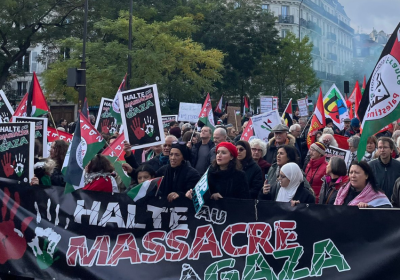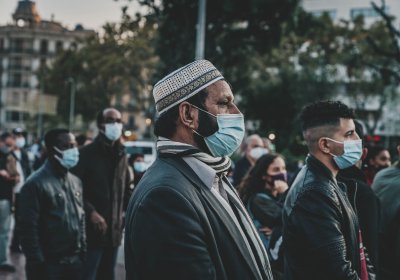Mass pro-Palestinian demonstrations, called by the five major trade union confederations, were held across France, following a week of solidarity actions in response to Israeli attacks on the Gaza Freedom Flotilla, reports John Mullen.
Emmanuel Macron
At the end of a two-month trial, far‑right leader Marine Le Pen has been found guilty of embezzling millions of euros in public funds over an 11‑year period. However, stopping fascism requires mass counter mobilisation, writes John Mullen.
The Left Berlin’s Phil Butland spoke to Paris activist John Mullen about what French president Emmanuel Macron hopes to achieve with the appointment of new right-wing prime minister François Bayrou.
John Mullen looks behind the no-confidence motion in the French assembly and what this means for the struggle against the far right and for fundamental change.
After France’s recent parliamentary elections, President Emmanuel Macron refused to allow the Nouveau Front Populaire left alliance to form government. Tempest interviewed Marxist activist John Mullen about the challenges facing the left in France following the formation of the new right-wing government.
Paris-based anticapitalist activist and Green Left contributor John Mullen spoke to German publication Marx21 on July 12 about the July 7 French election result and the immediate challenges for the left.
While elections are not at the centre of class struggle, the formation of left-wing electoral alliance the New Popular Front has inspired a wider and deeper anti-fascist mobilisation in France, argues John Mullen.
Green Left’s Susan Price spoke with John Mullen, an anticapitalist activist living in Paris and a supporter of the left-wing France Insoumise, following the far-right's gains in the recent European elections and French President Emmanuel Macron’s decision to call a snap election.
A mass demonstration in Paris on November 12 purported to oppose rising antisemitism, but was, in fact, aimed at crippling the pro Palestine movement. John Mullen explains.
The manoeuvring between French president, the Australian PM and the US President was on full display at the G20, writes Binoy Kampmark.
Islamophobia in France has been growing in strength for many years, but has dangerously accelerated in recent weeks, writes John Mullen.
The second round of the French local elections was bad news for President Emanuel Macron and his austerity agenda, writes John Mullen.
- Page 1
- Next page











